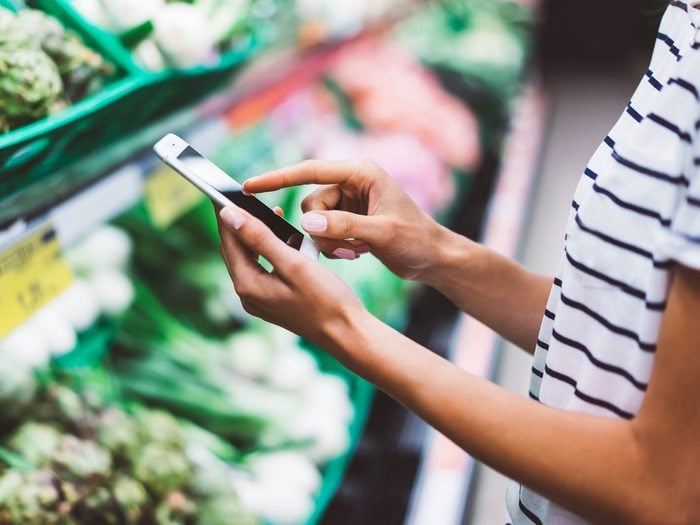
Over-emphasizing health food
Start with the fact that there are plenty of unhealthy foods that masquerade as healthy. Although choosing healthy foods are the correct path, they can’t be consumed without keeping portions in check. “My patients often report eating low-carbohydrate, high-protein diets full of healthful foods like quinoa, green leafy vegetables and berries, but they are eating too much of these foods,” says Gillian Goddard, MD, an endocrinologist and certified nutrition support clinician in New York City. “What makes foods healthy is their nutrient content. This does not mean we can eat them in limitless quantities.” For example, a half cup of quinoa has 111 calories. “Most people are eating two or three cups of quinoa in a sitting which can come in at 400-600 calories. That doesn’t include, the nuts, cheese and olive oil they’re adding,” adds Dr. Goddard. These 17 healthy foods are actually dangerous to overeat.
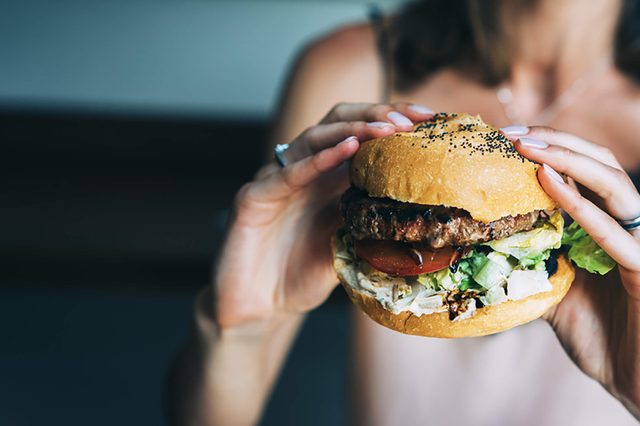
Failing to understand cravings
They’re not easy to deal with. Julia Ross, author of the new book, The Craving Cure: Identify Your Craving Type to Activate Your Natural Appetite Control, says that when it comes to eating, the brain’s directives are all-powerful. Unfortunately, she says, the brain is telling most of us to eat sweets, fried foods, and starchy pastas and breads. Instead she advises not to skip meals and to make better choices to ward off bad choices. “Increase your protein at each meal and include some red meat along with poultry and fish. This kind of dense protein, eaten regularly, is the most effective food for turning off cravings for sweet and starchy ‘treats,'” Ross continues. Check out these 15 weight-loss mistakes nearly everyone makes.

Treating weight loss as punishment
Finding the willpower to shed pounds is tough enough. If you consider your weight-loss efforts as punishment, you’ll start to resent your diet—especially in social situations. “You’re staring down the bread basket or considering dessert,” says fitness instructor Jenna Bergen Southerland in an article in Prevention. Your thought process may be that everyone else is getting to eat those things, and you can’t.
Southerland says to not look at it as deprivation. “Food, in general, is certainly a necessity. But a brownie? So the next time this thought whispers across your brain, take a step back and ask yourself two questions: Am I really depriving myself of a necessity? If I don’t change my eating habits, what am I really depriving myself of? The answer: A healthier, happier life. Keep that in mind and you’ll happily pass up the junk.” Make sure you know these 10 proven ways to live a healthier life.
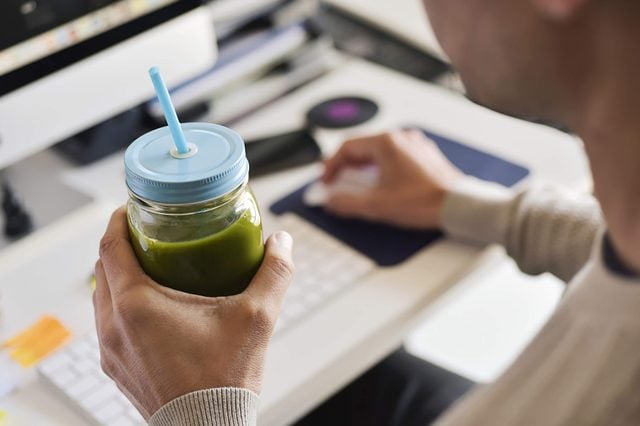
Not watching liquid calories
Even healthy drinks like fruit juice or smoothies have a ton of calories and sugar. When you’re trying to lose weight these drinks can seem like a sensible tactic, but if you have too much it can seriously undermine your success, points out, Yvonne Sanders, U.S. head of operations, with Slimming World, an online weight-loss food optimization platform based in Dallas. These fitness professionals share their best tips on how to drop weight in two weeks.
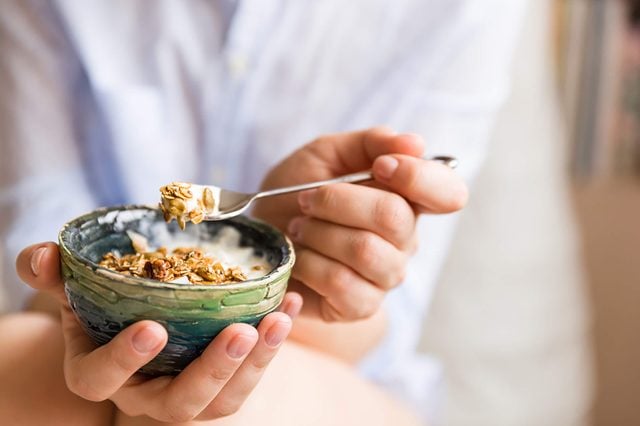
Not snacking strategically
When people go more than three hours between meals they can become too hungry and then overeat whatever comes their way, explains Dafna Chazin, RDN, a dietitian at a weight loss practice in Voorhees, New Jersey. “Most people need two snacks in the afternoon hours, spaced out and protein-rich, to curb hunger and reduce impulsive eating.” Some good snack choices include Greek yogurt, hard-boiled egg, cottage cheese, fruit, and nuts, she says. Find out how mindful eating can help you lose weight.
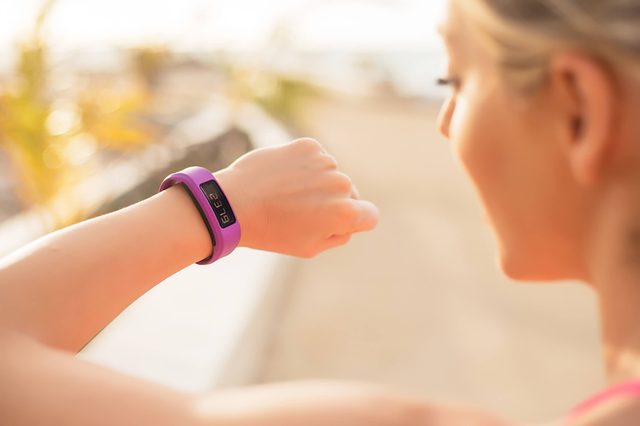
Relying on calorie counting
Many weight-loss experts still claim that a calorie is a calorie—but that’s flat out wrong. “A 100-calorie pack of cookies is not going to provide the same nutritional value as something like a green smoothie,” says Lindsey Smith, author of the forthcoming book, Eat Your Feelings: The Food Mood Girl’s Guide to Transforming Your Emotional Eating. “While the green smoothie may have more calories, it also has way more nutrients that can help your body lose weight, keep it off, and feel mentally and physically healthy.” These 20 foods are never worth the calories.
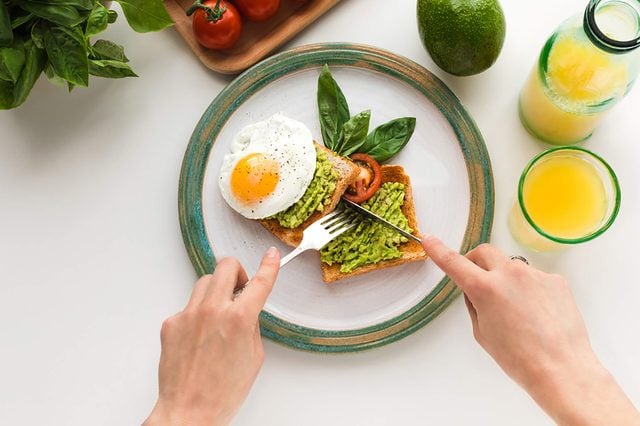
Cutting out fat
Saying fat will make you fat is so 1990s, quips Smith. “You need it to keep hunger away for hours, to think clearly, and to make good decisions and function throughout the day,” Smith says. “Plus, most items that claim they are ‘low-fat’ are usually packed with sugar or other chemicals to make up for the flavour loss, and they can actually lead to more weight gain.” She also advises to incorporate healthy choices such as avocados, coconut oil, fish, nuts and seeds. Here are 30 guilt-free snacks to curb your cravings.
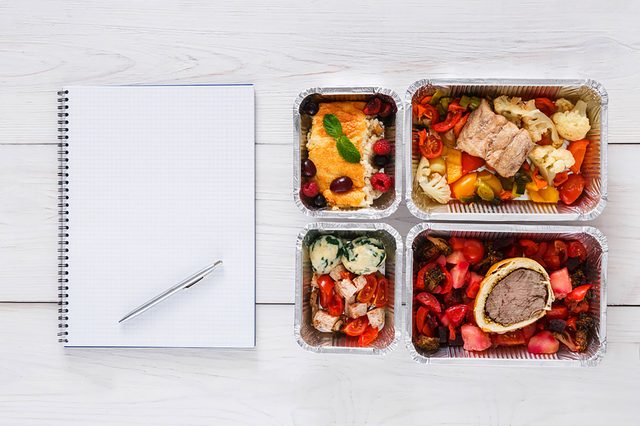
Skipping meals
“It’s almost logical to think that if you skip meals or cut your food intake drastically, you’ll cut out more calories over the course of the day, but it rarely works that way,” says Susan Bowerman, MS, RD, CSSD, CSOWM, FAND, and director of worldwide nutrition education and training Herbalife Nutrition in Los Angeles. “Skipping meals and cutting back invariably leads to uncontrollable hunger and overeating.”
Instead, she advises to plan out how you can distribute your daily calories over three meals and one or two snacks. “It’s easier to practice portion control when you know you’ll be eating every few hours, and you’ll help to break the ‘starve-then-binge’ habit,” Bowerman says. Gearing up for holiday cheese platters? Here’s what 100 calories of cheese actually looks like.

Rewarding exercise with food
Many people fool themselves into thinking they’ve burned off a lot more calories during exercise than they actually have, and they use that as an excuse to indulge, Bowerman says. “Be aware of how many calories you actually burn when you exercise (you can find lots of resources online), and compare that to the calories you’re tempted to take in afterwards.” Also, keep a log of the type of exercise you do and the amount of time you spend doing it. This journaling can keep track of what you’re taking in and what you’re burning. Here are 18 tips a weight-loss coach won’t tell you for free.

Negative self-talk
Don’t be so hard on yourself, Bowerman says. “If you think you should be perfect—that you’ll always exercise every morning or never eat another piece of candy—you’re setting the bar awfully high,” she says. The fix here is to practice positive self-talk. “Offer the same support to yourself as you would to a friend. You wouldn’t tell your friend who’s struggling with weight, ‘You just don’t have the willpower. I guess you’ll just be fat for the rest of your life.’ So, why do you say that to yourself?” Here’s the surprising way positive thinking can transform your life.
Practice talking nicely to yourself. “Offer yourself support. Instead of, ‘This is too hard.’ Think to yourself, ‘I can do this,'” says Bowerman.
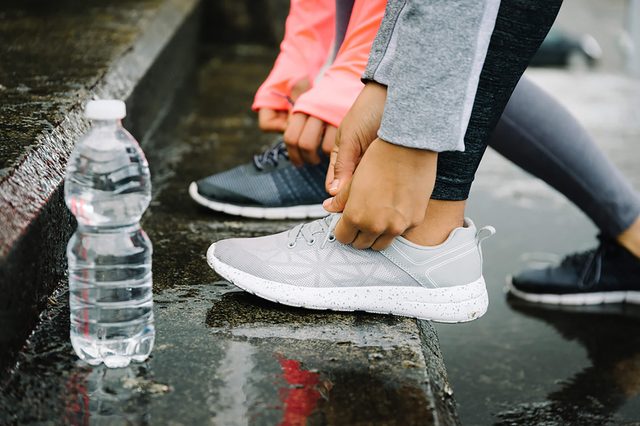
Not enough water
Many people fail to drink enough water, and this is a big factor in blocking weight loss progress, says Sean McCaffrey, DC, a chiropractor who operates McCaffrey Family Health in Springfield, Illinois, where he offers a weight-loss clinic. “Water makes you feel full, which helps to curb appetite,” he says, plus it’s necessary for digestion and to prevent dehydration.
Also, a proper supply of water is needed to help the body burn fat. “Six to eight, eight-ounce glasses are recommended but some people need more or less, depending on the climate they live in, their overall health and how much exercise they do,” McCaffrey adds. When you get eight full glasses of water a day, these 9 things happen to your body.
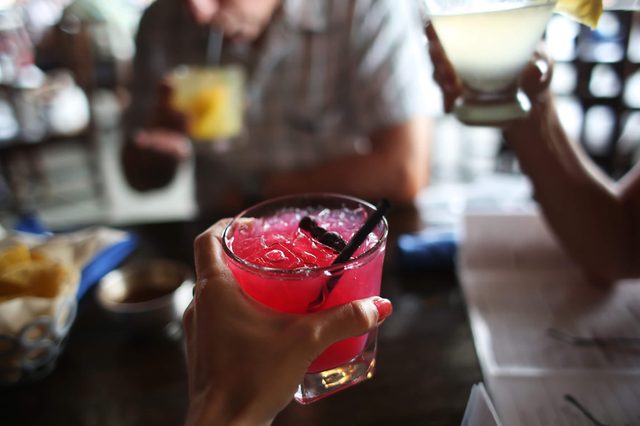
Taking weekends off
It isn’t hard to undo a week of careful eating with just a few indulgences over the weekend. “Your weight isn’t going to budge if you’re constantly taking two steps forward and two steps back,” Bowerman says. To keep on the right track, do your weekly weigh-in on Friday mornings rather than Mondays. “If you’ve had a good week, it will show on the scale and will help keep you motivated throughout the weekend. You can also ‘bank’ a few calories during the week to spend on the weekend,” Bowerman says. “But be careful and know the calorie content of your indulgences. A margarita and a basket of chips could set you back several hundred calories.” Learn why this nutritionist believes eating is all about moderation.
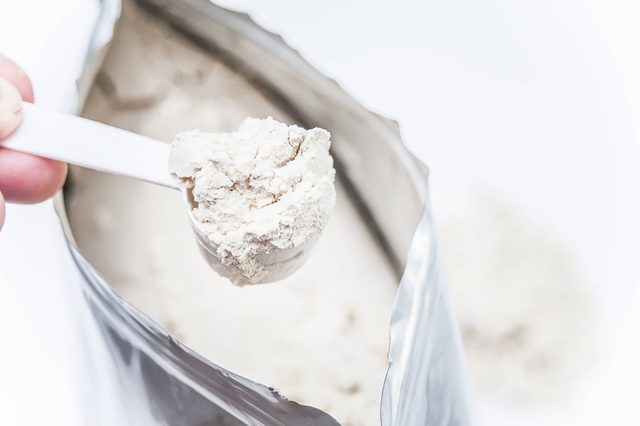
Too much protein
While protein is an important part of a healthy diet, too much of a good thing can block your weight-loss success. “If it runs, jumps, swims or flies, it tends to be good protein,” Dr. McCaffrey adds. He cautions relying on protein powders or shakes. “They often have lots of sugar and other additives. Under certain circumstances, these may be appropriate to use but most people can easily get adequate protein through their diet,” he says. These 7 things happen to your body when you don’t get enough protein.

Not enough sleep
Rebecca Lewis, RD, in-house dietitian at HelloFresh, says even just a single night of poor sleep can make you feel hungrier than usual the next day. “Instead, make sure you are getting seven to eight hours of sleep a night. Start by turning down lights and powering down your electronics about an hour before bed,” she says. Here are the 13 strange habits that could be wrecking your sleep.
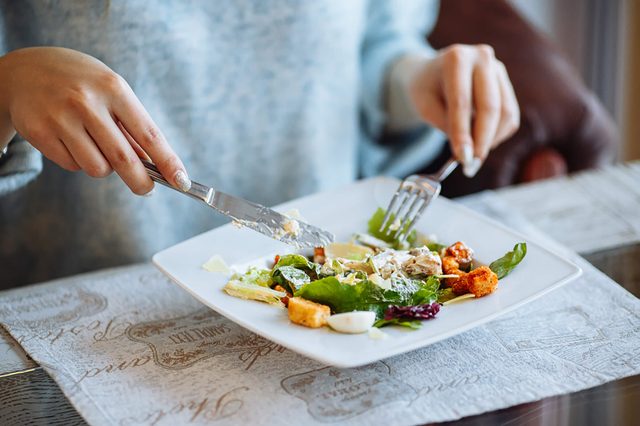
Eating too fast
Slow down as you eat your meals, as it takes time for the signal from your stomach to get to your brain that you’ve just eaten, says Lewis. “Without that signal, we’re inclined to keep eating until we are full—and then end up stuffed. Instead, slow down, put your fork down between bites, try to stretch your meal to be a full 20 minutes, and stop eating when you’re medium-full.” Next, check out 8 diet changes you need to make if you have IBS.
